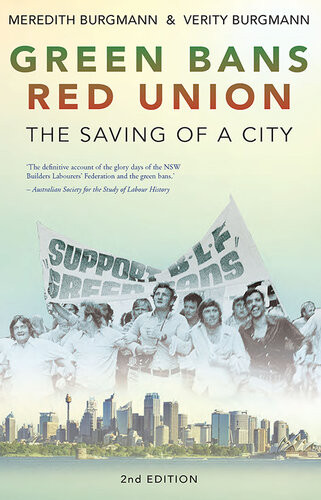

Most ebook files are in PDF format, so you can easily read them using various software such as Foxit Reader or directly on the Google Chrome browser.
Some ebook files are released by publishers in other formats such as .awz, .mobi, .epub, .fb2, etc. You may need to install specific software to read these formats on mobile/PC, such as Calibre.
Please read the tutorial at this link: https://ebookbell.com/faq
We offer FREE conversion to the popular formats you request; however, this may take some time. Therefore, right after payment, please email us, and we will try to provide the service as quickly as possible.
For some exceptional file formats or broken links (if any), please refrain from opening any disputes. Instead, email us first, and we will try to assist within a maximum of 6 hours.
EbookBell Team

0.0
0 reviewsTwenty years ago when the first edition of Green Bans Red Union was published, we were uncertain whether its relevance would continue and its message grow. We need not have wondered. The green bans and the heroic workers who initiated and defended them have become iconic in the present-day struggle of communities to control the environment in which they live. Not just in Australia but internationally, the story of the NSW Builders Labourers’ Federation (NSWBLF) and their world’s first environmental action struck a chord.
In recent times the problem of global warming has directed urgent attention to issues of environmental protection and emissions reduction. People around the world have waited impatiently for political leaders to tackle climate change but have been largely disappointed in their demands for meaningful action against the corporations who gain profit by polluting the planet.
Four decades ago the power of workers to prevent environmental damage – when politicians ducked the task – was forcibly demonstrated in the green bans movement of the NSWBLF, which refused to work on environmentally irresponsible projects and based this pioneering action on the concept of ‘the social responsibility of labour’. Workers’ organisations overseas are starting to contemplate green bans in the fight against global warming and are discovering the inspiring story of the NSWBLF.
The power of labour to protect the environment is commonly discounted in discussions of ecological problems, including climate change. For example, German sociologist Ulrich Beck’s classic 1992 book The Risk Society ignores the role that organised workers could play in confronting ecological irresponsibility. He writes about the importance of ‘public debate’, ‘dissent-ing voices’ and ‘alternative experts’ to prevent environmental hazards. Yet public outrage in the instance he discusses in his book – a lead crystal factory dropping flecks of lead and arsenic on the German town of Altenstadt…